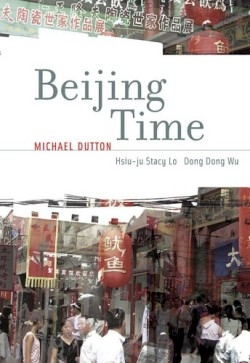Beijing Time
The Revolution of 1949, which installed into power the Communist Party of China, also combined China’s five time zones into one—Beijing’s time: Central Time. “This collapsing of multiple time zones into one was no pragmatic exercise to appease a farming lobby or maximize daylight,” Dutton writes. “It was a political decision to centralize all decision-making, including those about time, in Beijing and in the hands of the Party’s Central Committee…” Dutton insists that it is impossible to overestimate the importance of this revolution and its effects on the people of Beijing. Even today the divide exists between the vastly different time periods of “before liberation” and “after liberation.”
Like China’s Chairman Mao himself, whose regime simultaneously industrialized the nation and resulted in the deaths of tens of millions, Beijing is full of contradictions. In Beijing Time, Michael Dutton, professor of politics at Goldsmiths University and author of the Joseph Levenson Prize-winning Policing Chinese Politics, takes readers into the city as viewed by a native and explores these discrepancies with a scholar’s eye.
To most Westerners, the words “Tiananmen Square” evoke only the bloody protest of 1989, but to the Chinese, the Square is “the glorious place where New China was proclaimed, and from where a very different China is now arising,” Dutton writes. It is the place where all Chinese tours of the city begin. Here, Mao Zedong stood before a crowd and announced the establishment of the People’s Republic; here also Mao was laid to rest in a crystal tomb. But Tiananmen Square is, at the same time, the scene of a great deception. From 1969 to 1970, the 550-year-old Gate of Heavenly Peace, crumbling after the earthquake of 1966, was reconstructed under cover by trusted workers associated with the military. That the existing gate was a copy remained a secret for more thirty years.
Dutton introduces readers to several Beijing neighborhoods and the disparate attitudes that exist in each. CD manufacturers routinely send excess disks abroad for disposal. To discourage illegal sale, they are first “destroyed” with a saw gash cut through the outside portion of the disk. These saw-gash CDs have for years been a part of life for Chinese youth willing to skip the first couple unplayable tracks. The saw-gash generation, heavily influenced by Western culture and the new consumer-oriented culture encroaching on their own society, coexists with the older generations. Li and Huang, a couple who left their hometown for the first time to come to Beijing for better-paying jobs now sort garbage in Bajiacun, an area of Beijing whose stacks of metallic rubbish Dutton calls a “grotesque, uncanny parody of the city itself.” These mountains of trash—or treasure for some—are the result of the commerce-driven economy of New China.
The author draws insightful comparisons with an occasionally ponderous flair for the dramatic. Little background information is given for historical events, making Beijing Time most appropriate for readers with at least a basic knowledge of Chinese history.
Reviewed by
Whitney Hallberg
Disclosure: This article is not an endorsement, but a review. The publisher of this book provided free copies of the book to have their book reviewed by a professional reviewer. No fee was paid by the publisher for this review. Foreword Reviews only recommends books that we love. Foreword Magazine, Inc. is disclosing this in accordance with the Federal Trade Commission’s 16 CFR, Part 255.

